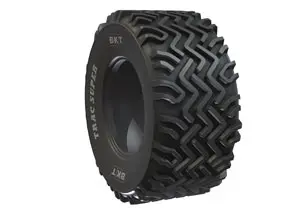Through years of case studies and feedback collected from its users, BKT’s team of experts have offered advice to address safety challenges while working on slopes
Besides operational difficulties and mechanical effort, there is often a twofold risk of rollovers or accidents while driving over sloping terrains, making driver’s safety a major concern. Based on experience in the field and keeping safety in mind, BKT’s team of experts were able to come up with suggestions regarding which product was best suited for the type of operations required.
For instance, considering operation on slopes, factors such as inflation pressure, tread, width, structure, footprint, compound, and size need to be aligned with other parameters, depending on the type of equipment on which the tyres will be mounted, the type of operations, operating hours and conditions, inclination of the terrain, and so forth.
Among these factors, tyre pressure is the most important parameter to be considered while working on slopes. Inadequately inflated tyres for instance may be at high risk of slipping from their rims. Damage and potential bead breaking may also result from the strong mechanical stress on the sidewall and bead that tyres often undergo while operating on slopes exceeding 11 degrees. Moreover, using radial tyres on slopes with the recommended inflation pressure values for normal agricultural use may lead to potential and dangerous overturns of the equipment.
Therefore, experts have suggested a recommended minimum pressure of 0.6 bar (9 psi) for normal conditions, but when operating on slopes with an inclination of up to 20%, pressure can be increased up to +25% without exceeding the maximum nominal tyre inflation pressure value. The pressure needs to be increased as to the specific slope. Hence, it is recommended to conduct a careful analysis of the load distribution.
Technically speaking, increased inflation pressure has several advantages during uphill and downhill slope operations such as improved bead-wheel adherence; reduced sidewall flexion; and an optimal footprint on the ground that will facilitate the correct rolling of the tyre, thereby optimising its traction.
Tyre tread and size are also elements that affect the safety and performance of tyres on slopes. For example, radial tyres are generally the most common products used in hill applications, for both tractors and combines. Since they have a flatter and wider footprint on the ground compared to conventional tyres, they tend to provide better traction and lateral stability.
Furthermore, the right tread pattern enhances equipment performance on slimy or slippery grass and enables to roll without damaging the ground on which operations are done. Also, as far as tyre size is concerned, those having a smaller diameter and larger width are preferable since they guarantee better stability.
TRAC SUPER and AGRIMAX RT 765 are two products that BKT offers for applications on slopes. The former is a radial tyre, particularly suitable for applications on large surfaces, such as meadows, parks, wide road transfers and slopes. The latter is a BKT 70 series tyre that ensures optimal traction and comfort on all surfaces at any time thanks to its large contact patch. It is suitable for farming machinery operating on light and medium slopes in heavy-duty applications while ensuring reduced soil compaction.





